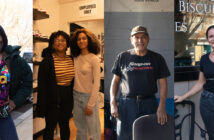If all of the displaced people in the world were placed into one country, the group would form the 24th largest country in the world.

Katie Morris
There are approximately 60 million people who have been forced to leave their homes as a result of civil war, genocide or extreme poverty. One of the groups getting the most attention is Syrian refugees, who are contributing to the largest exodus ever from a single country. The hardships these Syrians face are brutal and people need to know what is happening to them.
Yet, there’s another group of refugees that is suffering just the same and is receiving little attention. It’s a minority Muslim group called the Rohingyas and it has been cited as one of the world’s most persecuted minority groups.
The persecution is taking place in Myanmar, where the minority group is forced to live in ghetto-like camps without proper access to food, water or education. Nicolas Kristof, a New York Times columnist, refers to the genocide as “the worst ethnic cleansing you’ve never heard of.”
Some experts claim that the Rohingya population is facing the final stages of genocide. TIME magazine discusses the six stages of genocide as outlined by Daniel Feierstein. He said the Rohingya have already undergone the first four stages: stigmatization and dehumanization, harassment, violence and terror, isolation and segregation, and systematic weakness. He adds that the group is on the verge of “mass annihilation.”
Sadly, the Rohingya are not even one of the 135 ethnicities recognized by Myanmar. According to Kristof, the government doesn’t even recognize that these people exist and refuses to even say the word Rohingya.
So now you may be wondering, “If things are this bad, why don’t people know about it?” The issue is that Myanmar is good at making sure humanitarians and journalists do not enter the country or go near the ghetto camps. The genocide of these people is a well-kept secret.
The severe oppression that these people suffer can largely be credited to their departing president, Thein Sein. He ensured that the Rohingya people suffered to the largest extent possible. He signed laws that were clearly aimed at the minority and sent them to concentration camps where they lacked living necessities.
In these camps, even a simple cut can be deadly. Kristof wrote about a 14-year-old boy who died after he contracted tetanus from a cut on his foot. He also wrote about a young mother who died after contracting Hepatitis A. These diseases are slowly killing the Muslim minority group.
Many of these people were once highly educated and well off. In fact, a lot of them have large sums of money in the bank but are unable to leave the camp to retrieve them. Instead, they are left to die.
Some choose to risk their lives and climb into inflatable boats hoping to make it to another country alive. These are just some of the people who contribute to the 60 million fleeing their home countries due to oppression.
The UNHCR has estimated that more than 110,000 people have fled Myanmar for countries like Thailand, the Philippines and Malaysia since 2012. This number doubled in 2015.
But even these countries can’t promise them safety. There are still human rights abuses in other Southeast Asian countries and the refugees are not always accepted.
Thomas Fuller, a New York Times reporter, said that he personally went out into the sea and found a boat filled with refugees from Myanmar who had been abandoned by their crew. He delivered bottled water to the boat, which was full of women and children.
However, under the cover of darkness and away from the eyes of any journalists, the Thai navy pushed the boat back into the ocean.
The refugees contributing to the overall sum of 60 million are coming from all over the world. They have different religions and cultures but they are all suffering. They have all experienced atrocities most of us cannot even begin to imagine and they are waiting for our politicians to help them.
The best thing that we can do is it to be aware of the situation and to understand where these refugees are coming from. We can spread the world about these people who are being oppressed and we can teach other people to understand as well. After all, a sense of understanding is the first key to change.
—
Katie Morris, ’18, is an assistant news editor for The Brown and White. She can be reached at [email protected].





Comment policy
Comments posted to The Brown and White website are reviewed by a moderator before being approved. Incendiary speech or harassing language, including comments targeted at individuals, may be deemed unacceptable and not published. Spam and other soliciting will also be declined.
The Brown and White also reserves the right to not publish entirely anonymous comments.
1 Comment
Please help Rohingya refugees in Indonesia Makassar to resettle